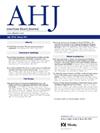Comparative Cardiovascular Benefits of Semaglutide Adjunctive to Bariatric Surgery: A Real-World Analysis Using TriNetX
IF 3.5
2区 医学
Q1 CARDIAC & CARDIOVASCULAR SYSTEMS
引用次数: 0
Abstract
Background
Bariatric surgery provides significant benefits for patients with obesity, but cardiovascular outcomes might be further improved with adjunctive pharmacotherapy. This study aimed to evaluate the cardiovascular benefits of semaglutide as an adjunct to bariatric surgery compared to bariatric surgery alone.
Methods
Using the TriNetX Global Collaborative Network, we conducted a retrospective cohort study of patients with obesity (BMI ≥30 kg/m²) who underwent bariatric surgery. The semaglutide cohort (n=37,026) included patients who received semaglutide after bariatric surgery, while the control cohort (n=273,513) included those who underwent bariatric surgery without semaglutide. After propensity score matching (n=36,744 per group), we analyzed cardiovascular outcomes over a 5-year follow-up period.
Results
Semaglutide use was associated with significantly lower all-cause mortality (1.0% vs 2.2%; HR 0.362, 95% CI 0.320-0.410; p<0.001) and cardiogenic shock (0.1% vs 0.2%; HR 0.470, 95% CI 0.330-0.671; p<0.001). Patients receiving semaglutide demonstrated lower incidence of pulmonary complications, including pulmonary edema (HR 0.595), pulmonary hypertension (HR 0.600), and pulmonary embolism (HR 0.709). Semaglutide was also associated with reduced risk of acute kidney injury (HR 0.742) and atrial fibrillation (HR 0.781).
Conclusion
In patients with obesity who underwent bariatric surgery, adjunctive semaglutide therapy was associated with significantly lower mortality and reduced incidence of major cardiovascular and renal complications. These findings suggest that combining semaglutide with bariatric surgery may provide additive cardiovascular protection.
西马鲁肽辅助减肥手术的心血管益处比较:使用TriNetX的真实世界分析
背景:减肥手术为肥胖患者提供了显著的益处,但辅助药物治疗可能会进一步改善心血管预后。本研究旨在评估西马鲁肽作为辅助减肥手术与单独减肥手术相比对心血管的益处。方法使用TriNetX全球协作网络,我们对接受减肥手术的肥胖(BMI≥30 kg/m²)患者进行了回顾性队列研究。semaglutide队列(n=37,026)包括在减肥手术后接受semaglutide的患者,而对照队列(n=273,513)包括那些接受减肥手术而不使用semaglutide的患者。在倾向评分匹配后(每组n=36,744),我们分析了5年随访期间的心血管结局。结果semaglutide的使用显著降低了全因死亡率(1.0% vs 2.2%; HR 0.362, 95% CI 0.320-0.410; p<0.001)和心源性休克(0.1% vs 0.2%; HR 0.470, 95% CI 0.330-0.671; p<0.001)。接受西马鲁肽治疗的患者肺部并发症发生率较低,包括肺水肿(HR 0.595)、肺动脉高压(HR 0.600)和肺栓塞(HR 0.709)。Semaglutide还与降低急性肾损伤(HR 0.742)和房颤(HR 0.781)的风险相关。结论在接受减肥手术的肥胖患者中,辅助西马鲁肽治疗可显著降低死亡率,降低主要心血管和肾脏并发症的发生率。这些发现表明,西马鲁肽联合减肥手术可能提供额外的心血管保护。
本文章由计算机程序翻译,如有差异,请以英文原文为准。
求助全文
约1分钟内获得全文
求助全文
来源期刊

American heart journal
医学-心血管系统
CiteScore
8.20
自引率
2.10%
发文量
214
审稿时长
38 days
期刊介绍:
The American Heart Journal will consider for publication suitable articles on topics pertaining to the broad discipline of cardiovascular disease. Our goal is to provide the reader primary investigation, scholarly review, and opinion concerning the practice of cardiovascular medicine. We especially encourage submission of 3 types of reports that are not frequently seen in cardiovascular journals: negative clinical studies, reports on study designs, and studies involving the organization of medical care. The Journal does not accept individual case reports or original articles involving bench laboratory or animal research.
 求助内容:
求助内容: 应助结果提醒方式:
应助结果提醒方式:


